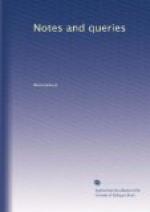In answer to “F.S. Martin”—Calamity (calamitas), not from calamus, as it is usually derived, but perhaps from obs. calamis, i.e. columis, from [Greek: kholo, kolhao, kolhazo] to maim, mutilate, and so for columitas. (See Riddle’s Lat.-Eng. Dictionary.)
AUGUSTINE.
Inquisition in Mexico.—“D.” wishes to be furnished with references to any works in which the actual establishment of the Inquisition in Mexico is mentioned or described, or in which any other information respecting it is conveyed.
Masters of St. Cross.—“H. EDWARDS” will be obliged by information of any work except Dugdale’s Monasticon, containing a list of the names of the Master of the Hospital of St. Cross, Winchester; or of the Masters or Priors of the same place before Humphry de Milers; and of the Masters between Bishop Sherborne, about 1491, and Bishop Compton, about 1674.
Etymology of “Dalston."—The hamlet of Hackney, now universally known only as Dalston, is spelt by most topographists Dorleston or Dalston. I have seen it in one old Gazette Darlston, and I observed it lately, on a stone let in to an old row of houses, Dolston; this was dated 1792. I have searched a great many books in vain to discover the etymology, and from it, of course, the correct spelling of the word, the oldest form of which that I can find is Dorleston.
The only probable derivations of it that I can find are the old words Doles and ton (from Saxon dun), a village built upon a slip of land between furrows of ploughed earth; or Dale (Dutch Dal), and stone, a bank in a valley. The word may, however, be derived from some man’s name, though I can find none at all like it in a long list of tenants upon Hackney Manor that I have searched. If any of your readers can furnish this information they will much oblige.
H.C. DE ST. CROIX.
"Brown Study"—a term generally applied to intense reverie. Why “brown,” rather than blue or yellow? Brown must be a corruption of some word. Query of “barren,” in the sense of fruitless or useless?
D.V.S.
Coal Brandy.—People now old can recollect that, when young, they heard people then old talk of “coal-brandy.” What was this? Cold? or, in modern phase, raw, neat, or genuine?
CANTAB.
Swot.—I have often heard military men talk of swot, meaning thereby mathematics; and persons eminent in that science are termed “good swots.” As I never heard the word except amongst the military, but there almost universally in “free and {353} easy,” conversation, I am led to think it a cant term. At any rate, I shall be glad to be informed of its origin,—if it be not lost in the mists of soldierly antiquity.
CANTAB.




